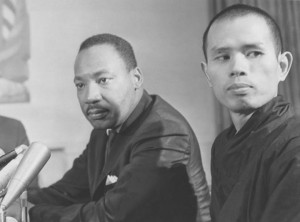Reverence for Life & Animal Liberation in Buddhism
In order to simplify or make accessible the four noble truths and eight fold path (Buddhist teachings/percepts) to the diversity, especially English speaking people, the great sage Thich Nhat Hanh came up with the ‘five mindfulness trainings’. Here we shall examine a few verses mainly from the first mindfulness training “Reverence for Life”. In the following quotation Thich Nhat Hanh summarises the first mindful training in an interview with Andrea Miller:
“..The first one is about protecting life and is motivated by the insight of interbeing and compassion…” ~Thich Nhat Hanh
We can see that Buddhism (or at least Thich Nhat Hanh) is a strong promoter of protecting life and that key motivations for this are compassion and insight of inter-being.  This commitment is generally expressed through adherence to a simple vegan diet and is common authentic traditional Buddhism. For example, Shaolin monks hold this view, and happen to be of the most physically and psychologically fittest people in the world today. Are they getting enough protein? Go through the videos in the playlist beginning with Thich Nhat Hanh’s interview with Oprah Winfrey.
This commitment is generally expressed through adherence to a simple vegan diet and is common authentic traditional Buddhism. For example, Shaolin monks hold this view, and happen to be of the most physically and psychologically fittest people in the world today. Are they getting enough protein? Go through the videos in the playlist beginning with Thich Nhat Hanh’s interview with Oprah Winfrey.
Nevertheless, some sects take their commitment a little further than just being vegan for example, the Mahāyāna sects engage in various forms of civil disobedience and direct action, a point that we shall return to shortly following this first mindful training:
Aware of the suffering caused by the destruction of life, I am committed to cultivating the insight of interbeing and compassion and learning ways to protect the lives of people, animals, plants, and minerals. I am determined not to kill, not to let others kill, and not to support any act of killing in the world, in my thinking, or in my way of life. Seeing that harmful actions arise from anger, fear, greed, and intolerance, which in turn come from dualistic and discriminative thinking, I will cultivate openness, non-discrimination, and non-attachment to views in order to transform violence, fanaticism, and dogmatism in myself and in the world. ~Thich Nhat Hanh
Pretty nice uh? With regard to the Mahāyāna sect however it is unclear to what extent they adhere to veganism but it is highly likely that they exclude all animal derived food. Their expressions of mindfulness often include direct action and civil disobedient ranging from ‘tree hugging’ covering trees with sacred signs that render it immoral, sinful and/or disrespectful to bring harm to them. Other sects aim to liberate animals directly, for example by ‘reclaiming’ captive animals and retuning them to the wild or places of sanctuary like Kopan Monastry.
Thich Nhat Hanh
It doesn’t stop there! As it is not always possible for them to express their infinity with the animals due to outdated laws and traditions, some Buddhists, out of shear desperation to be heard are driven to self-immolation. Here Thich talks about his encounter with Dr. Martin Luther King and and self-immolation. Thich’s explanation echos that of UK activist Keith Mann who explains that
 due to corruption within the establishment, activists feel forced into a corner with very few meaningful ways to express their concern for the welfare of animals, hence sometimes resulting in their controversial but non-violent action. While such actions never bring second or third parties into any physical harm, there are clear risks of self injury associated with such actions although not carry out such acts of protest is more harmful to an activist/bodhisattva. It is down to our continuous line of complacency with the maltreatment of the weak/powerless that now sees our beloved planet on the brink of our self-destruction through the devastating amounts of green house gases we cause primarily though animal production. There are many other consequences associated with our maltreatment of animals and our failure to attribute rights to all beings.
due to corruption within the establishment, activists feel forced into a corner with very few meaningful ways to express their concern for the welfare of animals, hence sometimes resulting in their controversial but non-violent action. While such actions never bring second or third parties into any physical harm, there are clear risks of self injury associated with such actions although not carry out such acts of protest is more harmful to an activist/bodhisattva. It is down to our continuous line of complacency with the maltreatment of the weak/powerless that now sees our beloved planet on the brink of our self-destruction through the devastating amounts of green house gases we cause primarily though animal production. There are many other consequences associated with our maltreatment of animals and our failure to attribute rights to all beings.
“Every day forty thousand children die in the world for lack of food. We, who overeat in the West, who are feeding grains to animals to make meat, are eating the flesh of these children.“
“By eating meat we share the responsibility of climate change, the destruction of our forests, and the poisoning of our air and water. The simple act of becoming a vegan will make a difference in the health of our planet.“


